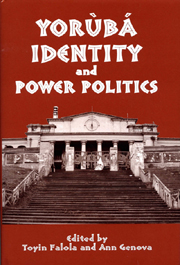Introduction
Published online by Cambridge University Press: 12 September 2012
Summary
In 1897, Samuel Johnson wrote in the preface to his pioneer work, The History of the Yorubas, asignificant statement:
Educated natives of Yorùbá are well acquainted with the history of England and with that of Rome and Greece, but of the history of their own country they know nothing whatever! This reproach it is one of the author's objects to remove.
This declaration, made more than a century ago, touches on the very issue that has not only captured the feelings of African scholars, but has also become a quasi-anthem for professional historians among the educated Yorùbá elite in Nigeria. Reconstructing the history of the Yorùbá, however, has posed in many ways a rewarding but challenging endeavor. Faced with racial discrimination and false notions about what constitutes legitimate history, Yorùbá scholars have charged forward to reclaim their academic space. The result is an impressive array of written and oral traditions, telling narratives, and rich ethnographies that offer the world a better understanding of Yorùbá history, politics, and culture. But the task of reconstructing the history of the Yorùbá does not lie solely on the shoulders of those residing within the confines of the geographic space recognized as Yorùbáland. Since the early twentieth century, Yorùbá studies have gained international attention because of the ethnic group's rich culture, political strength, and riveting history.
- Type
- Chapter
- Information
- Yorùbá Identity and Power Politics , pp. 1 - 26Publisher: Boydell & BrewerPrint publication year: 2006

